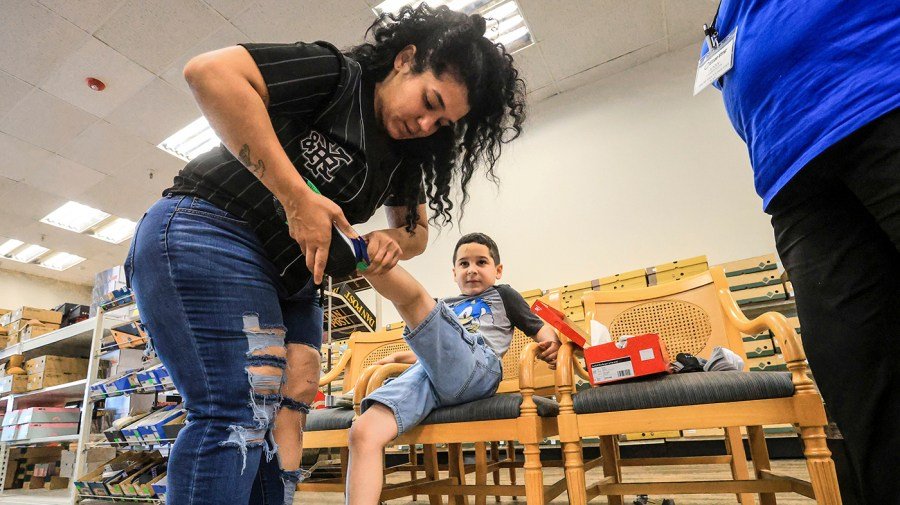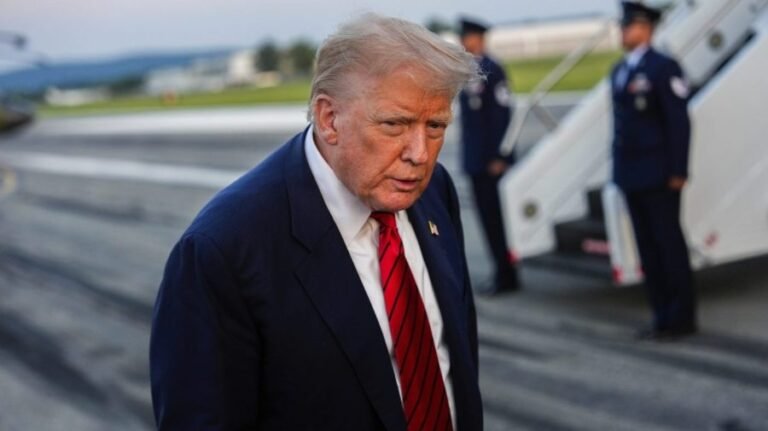
Parents have been scared into early back-to-school shopping as fears of tariffs and rising prices cause a record spike in related July purchases.
Recent surveys found most parents are expecting to pay more in back-to-school costs this year, and around half blame President Trump’s trade wars for the spike.
A National Retail Foundation (NRF) survey found 67 percent of back-to-school shoppers were already hitting stores before mid-July, up from 55 percent last year and the highest level since NRF started keeping track in 2018.
Fifty-one percent of those shoppers specifically cited concerns of increases in prices from tariffs as their reason for going early.
“Consumers are navigating an uncertain environment right now, and uncertainty is coming from they just don’t know how much things are going to cost later in the year, and they’re trying to deal with that by buying ahead of time, stocking up now, while they know what prices will be, and trying to get ahead of potential price increases later in the season or later in the year,” said Katherine Cullen, vice president of industry and consumer insights at NRF.
In a separate survey last week by U.S. News, 85 percent of shoppers said tariffs came to mind when thinking about price increases to back-to-school shopping.
Trump’s trade policies have been a whirlwind for even experts in the field, let alone parents.
The president has announced trade deals with partners such as Japan and the United Kingdom involving tariffs of 15 percent and 10 percent, respectively, while also declaring “reciprocal” tariffs on dozens of other nations, scheduled to take effect on Thursday.
While parents are looking to cut back on costs, many school supplies such as clothes and shoes are essential, and materials including pencils and notebooks are hard to buy second hand.
“Parents are going into the school year, and their kids have grown out of their sneakers, they’re going to figure out how to buy a pair of sneakers for school. So, maybe we’re going to see families dial back a little bit on the kind or quality of the items that they’re purchasing, but I think it’s also very likely that we see families dealing with these expenses by loading up on debt,” said Julie Margetta Morgan, president of the Century Foundation, a progressive think thank, pointing to credit cards or “buy now, pay later” options.
And as the trade wars drag on, inflation has been going up, rising by 2.7 percent in June, while the Federal Reserve’s target for inflation is 2 percent.
The Fed’s July beige book found tariffs increased costs in all of the Fed’s 12 regional districts, which then translated to higher costs for consumers.
And the increased costs come as the number of people needing extra assistance with back-to-school costs appears to be going up.
Dale Bannon, the national community relations and development secretary of the Salvation Army, said the “need is higher” this year, especially for “basic needs.”
“Many of the families we serve live paycheck to paycheck, and so, if there’s any kind of increase in price” it can have devastating effects them, Bannon said.
“We just partnered with Toyota, for example, where through their partnership, we are doubling the number of backpacks we’re distributing through a unique partnership with their dealers,” Bannon said, adding 17,000 backpacks full of essential supplies will be given to parents.
The president has doubled down on his tariff strategy, pronouncing the deals he will make with other countries will benefit the U.S. in the long term.
“And we have to solve our trade deficit with China. … Hundreds of billions of dollars a year we lose with China. And unless we solve that problem, I’m not going to make a deal,” Trump said when he began the trade wars back in the spring. “This is not sustainable.”
Many businesses also attempted to buy earlier in the spring so some of their products weren’t hit by tariffs, but not all purchases can be made ahead of time.
While prices are slowly going up now, experts predict the brunt of these policies will impact families further in the school year and around holiday season.
“It accelerated the shipping season, so it brought it forward, and also brought forward the shopping season, so people did their purchases earlier,” said Steve Lamar, president and CEO of the American Apparel & Footwear Association.
“They might have been much more willing to go out and purchase now, knowing that the tariffs will really begin to accelerate.” Lamar said, adding the tariff “uncertainty is having a chilling effect on sourcing, on investments, on hiring throughout the economy” and “also has a chilling effect on consumer behavior.”


